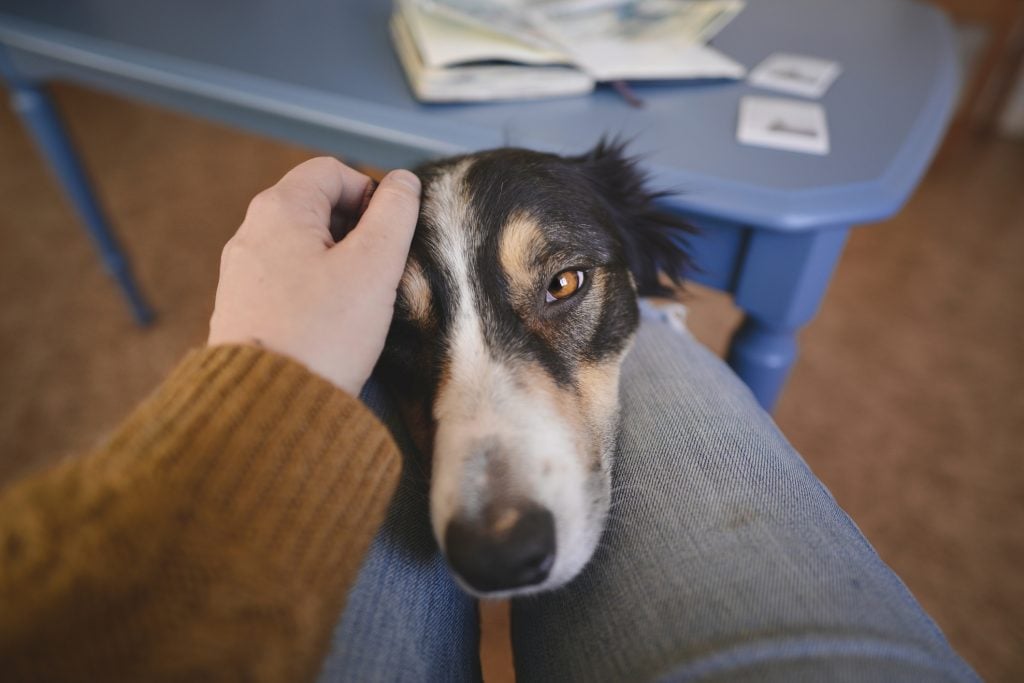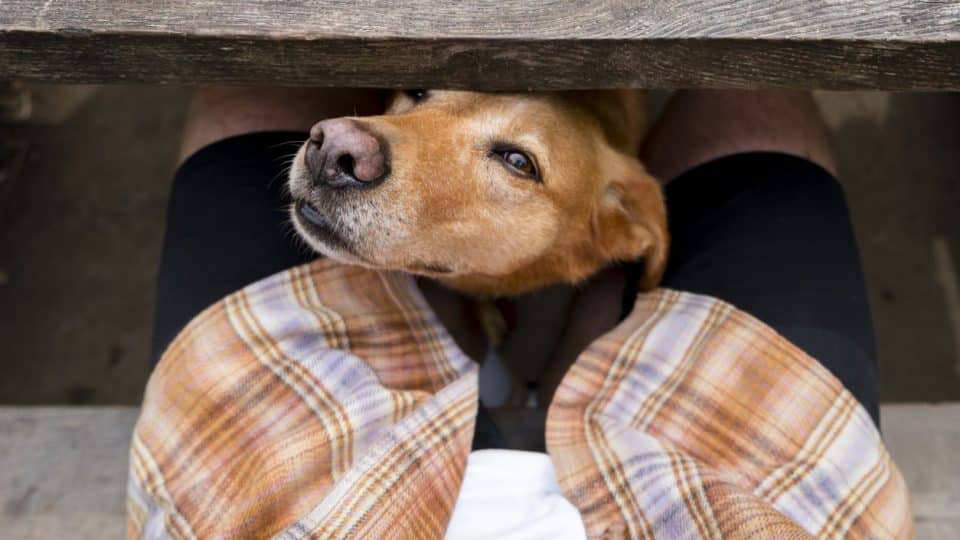Dogs love to introduce themselves by sniffing each other’s rear ends. But while sniffing crotches is a polite greeting among dogs, something gets lost in translation when they do the same to people.
Simply put, dogs like stinky things, says Jennifer Sperry, a veterinarian with Pets Plus Us Insurance. She explains that dogs gather unique information about a person by sniffing them. Dogs smell crotches because they contain strong-smelling sweat glands and are accessible to medium and large breeds—much to your guests’ chagrin.
Luckily for you and your friends, there may be ways you can redirect this nosy behaviour into a more polite greeting. Learn more about them below, and discover why dogs sniff crotches in the first place.
Why Do Dogs Smell Everything?
If you want to learn more about someone you just met, you can ask them questions – like “Where are you from?” Or, “How old are you?” But dogs don’t have the luxury of speech to communicate. So, they primarily rely on their noses to gather information about other dogs, people, and objects. Their noses are appropriately superpowered for the job.
When a dog inhales, around 12-13% of that air goes directly to their olfactory region, where 220 million scent receptors are waiting. That’s over 10,000 times more scent receptors than humans have, allowing them to pick up unique smells we can’t.
Why Do Dogs Smell Your Crotch Specifically?

iStock/Fenne
Dogs likely pick the crotch for a few different reasons. Beyond being a convenient sniffing height, it may also produce a stronger scent than other parts of the body. The human crotch contains apocrine sweat glands, which produce stronger-smelling sweat than glands in other parts of the body. These glands are also present in your armpits and chest, but most dogs can’t reach those spots to take a whiff.
Additionally, Dr. Sperry notes that you might be more aware of your dog’s sniffing habits when they zero in on the crotch rather than other spots like our hands or feet.
How to Get Dogs to Stop Sniffing Crotches
When your dog sniffs a houseguest, they’re just trying to get to know them better. But your guests probably don’t want a wet nose on their pants. So, how can you discourage crotch-sniffing in dogs?
While you may be tempted to improperly discipline your dog when they get nosy with a guest, your dog likely won’t understand what they did wrong or what you want them to do. So, it will only hurt your relationship and cause stress. Instead, Dr. Sperry says you can take a more positive route by redirecting their sniffing behaviour into a more polite outlet, such as
- Snuffle mats
- Puzzle toys
- Nosework
- Sniffer walks
When your dog gets their fill of sniffing through one of these methods, they may be less likely to seek new scents from your crotch.
How to Introduce Dogs to People Without Crotch-Sniffing
Redirecting crotch sniffing starts with proper introductions. Dr. Sperry advises pet parents to have one command on hand that their dog knows and can respond to.
For example, tell your dog to sit when guests walk into the house. The command will keep your pup occupied, saving guests uncomfortable moments. You can also train your dog to follow alternate greetings that don’t involve sniffing. One surefire alternate greeting is the paw high-five.
- Ensure your dog understands how to do the trick beforehand
- Have a friend enter the door slowly and quietly
- Give your dog the cue for a high-five
- Reward your dog with a training treat for performing the trick
Dr. Sperry says when pet parents reward this alternative greeting with guests, they’re less likely to resort to crotch sniffing.
When to See a Behaviourist About Crotch Sniffing
Most of the time, crotch sniffing, while inconvenient, is a perfectly normal behaviour in dogs and nothing to worry about. But, as with other behaviours, excessive sniffing can signal your dog is anxious. Other telltale signs of anxiety include:
- Destroying objects
- Whining
- Running in circles
- Shaking
- Licking air
- Sweaty paws
If you notice other signs of anxiety or can’t curb the sniffing no matter what you try, a behaviourist can help you understand how to handle your dog’s behaviour.
Takeaway
When your dog smells your crotch, they’re not trying to be rude. Instead, they only want to take in your scent and learn more about you.
But if this behaviour makes you or your guests uncomfortable, try satisfying your dog’s sniffing instincts in other ways. Remember: Positive reinforcement is key to training new behaviours and building a trusting relationship with your pup that will last a lifetime.



